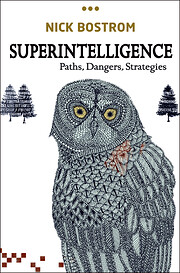

Click on a thumbnail to go to Google Books.
|
Loading... Superintelligence: Paths, Dangers, Strategies (2014)by Nick Bostrom
 None No current Talk conversations about this book.   ) )Longer review coming. In a nutshell, the first half of this book will make you seriously consider becoming a Luddite. The second half is more optimistic. It is a nice summary of the issues around the various possibilities for super-smart things (be they computers, people, a mix of the two, etc.), but it gets pedantic in places and does not present much of anything new for those who keep more or less current on the topic. não sei qual o problema das pessoas em fazerem listas de recomendações e apresentá-las com pequenos textos introdutórios e indicativos. existem inclusive alternativas, como postagens enredadas em hyperlinks (os tais dos caospatches, remendoscaos). pois livros inteiros que se dispõem a apresentar um cenário panorâmico de algo são em geral enfadonhos, ao mesmo tempo em que indicam uma quantidade desmesurada de leituras possivelmente interessantes (muitas vezes, com títulos do próprio autor). minha questão: dado que a principal tática é mostrar que há muito o que ser explorado, porque não tentar ser maximamente efetivo em relação a isso, montando o livro de modo mais conciso e técnico, ou então, realmente articulando exemplos curiosos e pedagógicos, falando a partir deles. the post-human, de rosi braidotti, e superintelligence: paths, dangers, strategies, de nick bostrom, sofrem por ficarem no meio termo: são panoramas genéricos, ao mesmo tempo que querem ser contribuições para os assuntos. dessa forma, os problemas que aparecem são vagos, esfumaçados – e gerais demais para serem úteis. é isso que é mapear? minha preocupação aqui é que parecem mapear o mapa (e no caso de bostrom, obviamente, nem é possível saber como é a cidade; o exemplo que menos gosto – quando ele fala da dificuldade de programar o que é o conceito de bom para uma inteligência artificial – ou seja, falar da dificuldade de programar algo que nem sabemos como seria possível pensar a programação). Five stars for the message, but I should have deducted one point for the flabby, often impenetrable academic writing style. Interesting overview and insightful perspectives of the future of AI. Cover a vast list of possible scenarios of the singularity. I recommend this book for every person that have at least a minimum interest in the field. I believe your brilliant ideas deserve an even wider audience. So, the next time you put pen to paper, please hire a good editor who can prune your text into lively and easily digestible prose for the general educated reader. The greater the number of regular people who understand what's at stake, the more likely that precautions will be taken. And isn't that what you're really after. Full disclosure: the author is a lot smarter than I am. (I appreciated the accessibility of the work.) This was also my first read devoted to AI development and its attendant pitfalls. I happen to agree with the conclusion (the development with AI has the potential to wipe us out). At the same time, I found some of the conclusions (particularly the more hopeful ones, unfortunately) hard to swallow. I don't think any AI once it reaches a human level or better will have any particular motivation to enhance our cosmic endowment (no matter how we approach the control problem); I think it will probably "wake up" insane. That said, the author provides a good overview of the history of AI development and a useful framework for thinking about the threat and how to meet it. (Also, in unrelated news, I would totally read a SF tale centered on an AI devoted to maximizing the number of paperclips in its future light cone.) no reviews | add a review
Notable Lists
The human brain has some capabilities that the brains of other animals lack. It is to these distinctive capabilities that our species owes its dominant position. Other animals have stronger muscles or sharper claws, but we have cleverer brains. If machine brains one day come to surpass human brains in general intelligence, then this new superintelligence could become very powerful. As the fate of the gorillas now depends more on us humans than on the gorillas themselves, so the fate of our species then would come to depend on the actions of the machine superintelligence. But we have one advantage: we get to make the first move. Will it be possible to construct a seed AI or otherwise to engineer initial conditions so as to make an intelligence explosion survivable? How could one achieve a controlled detonation? To get closer to an answer to this question, we must make our way through a fascinating landscape of topics and considerations. Read the book and learn about oracles, genies, singletons; about boxing methods, tripwires, and mind crime; about humanity's cosmic endowment and differential technological development; indirect normativity, instrumental convergence, whole brain emulation and technology couplings; Malthusian economics and dystopian evolution; artificial intelligence, and biological cognitive enhancement, and collective intelligence. No library descriptions found.
|
Current DiscussionsNonePopular covers
 Google Books — Loading... Google Books — Loading...GenresMelvil Decimal System (DDC)006.301Information Computer Science; Knowledge and Systems Special Topics Artificial IntelligenceLC ClassificationRatingAverage: (3.61) (3.61)
Is this you?Become a LibraryThing Author. |
||||||||||||||||||||||||||||||||||||||||||||||||||||||||||||||||||||||||||||||||||||||||||||||||||||||||||||||||||||||||||||||||